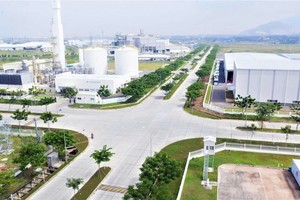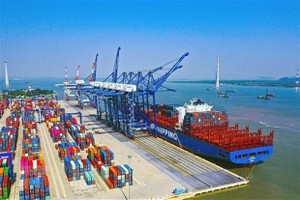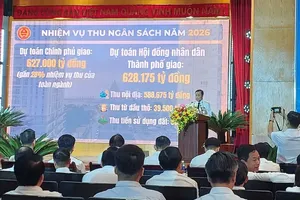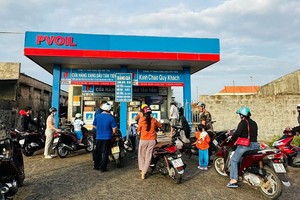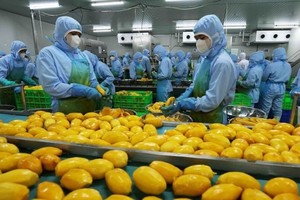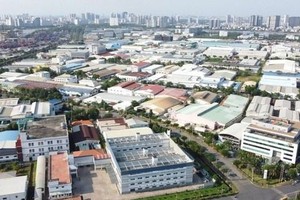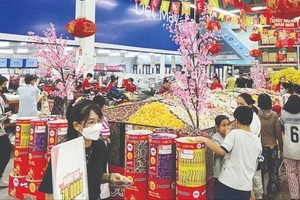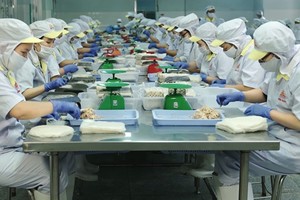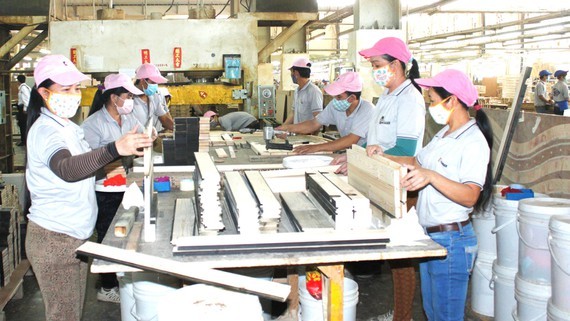
According to the latest statistics of the provincial Department of Industry and Trade, in the first quarter of this year, the export turnover of the province reached more than US$5.8 billion, up 3.6 percent; while import turnover was about $4.2 billion, up by 4.3 percent. Foreign trade also brought a trade surplus of $1.6 billion, creating a stable source of foreign currencies, which is a motivation for a large turnover increase in the following months. This result has contributed significantly to the FDI enterprise community, with total revenue (including domestic consumption and export) in the first quarter of this year estimated at $3.29 billion.
Generally, from the beginning of this year to the middle of March, FDI attraction into Binh Duong was $293.5 million, accounting for 54 percent of that in the same period last year. So far, the province has had 3,816 FDI projects with total registered capital of $34.6 billion with the average investment of about $9.11 million. Of these, 2,391 FDI projects are in industrial parks with a total capital of $23.1 billion, accounting for 67 percent of the FDI capital in the province.
Among 65 countries and territories registered to invest in Binh Duong Province, Japan is the leading country with 313 projects with a total registered capital of over $5.61 billion, accounting for 16.3 percent of total FDI capital in the province with the main fields being processing and manufacturing industries; followed by countries and territories such as Hong Kong, Taiwan (China), Singapore and South Korea.
According to Ms. Truong Thi Thuy Lien, Vice Chairwoman of Binh Duong Leather and Footwear Association, FDI enterprises in the industry have large-scale operations and advantages in the capital. Although accounting for only 30 percent of the number of enterprises, they contributed up to 70 percent of the total import-export turnover of footwear of the province. During the pandemic, these enterprises have been actively diversifying the market, searching for alternative sources of raw materials to replace the Chinese market, and willing to accept rising production costs when seeking new partners.
In addition, when the Covid-19 pandemic is being controlled, FDI enterprises have urged the production of orders signed from 2019 to avoid the situation that the pandemic might escalate, leading to a stop in production. Therefore, FDI enterprises did not have to cancel orders and delay production.
Sharing the same opinion, an official of VSIP Binh Duong Industrial Zone Management Board said that so far none of the FDI enterprises operating in VSIP has to suspend operations or produce perfunctorily. Mr. Dien Quang Hiep, Chairman of Binh Duong Furniture Association, also said that FDI enterprises have a lot of experience in trading in the world market, they also have lots of traditional customers and strong capital. Besides the support of the Vietnamese Government, they also have the support of their countries. For instance, the United States and European countries have launched large relief packages, directly supporting their businesses to continue the production.
Small and medium-sized FDI enterprises that depend on certain markets have been significantly affected by the Covid-19 pandemic. Mr. Bay Ly Nguyen, chairman of the Taiwan Furniture Manufacturers’ Association, said that the disease had affected 40 percent of Taiwanese enterprises in Binh Duong with an impact of about 50 percent of the operating capacity compared to before. Many companies have had to delay the production schedule, allow their employees and workers to take a break to prevent the disease but still ensure to pay 50 percent of the salary. At the same time, they search for new markets. Up to now, there have been positive results, so enterprises have asked their workers to return to work.
French company Dewberry with 800 workers has two factories in Binh Duong Province but now only one factory assembling finished products in Thuan An City is still open. The factory in Song Than Industrial Park in Di An City allowed for 80 percent of its workers to be off work temporarily while waiting for the parent company in France to resume operation after the country locked down to prevent the disease. However, the former factory has promoted the production of orders signed before the lunar New Year to limit the impacts of the disease on employment and the income of workers.
From the undesirable effects of the Covid-19 pandemic as mentioned above, many economic experts believe that, right now, enterprises need a long-term strategy, in which the right thing to do now is to make strategic plans in the new period with changes in the thinking of administration and technological innovation, creating connections to form the supply chains and diversify the market.
Generally, from the beginning of this year to the middle of March, FDI attraction into Binh Duong was $293.5 million, accounting for 54 percent of that in the same period last year. So far, the province has had 3,816 FDI projects with total registered capital of $34.6 billion with the average investment of about $9.11 million. Of these, 2,391 FDI projects are in industrial parks with a total capital of $23.1 billion, accounting for 67 percent of the FDI capital in the province.
Among 65 countries and territories registered to invest in Binh Duong Province, Japan is the leading country with 313 projects with a total registered capital of over $5.61 billion, accounting for 16.3 percent of total FDI capital in the province with the main fields being processing and manufacturing industries; followed by countries and territories such as Hong Kong, Taiwan (China), Singapore and South Korea.
According to Ms. Truong Thi Thuy Lien, Vice Chairwoman of Binh Duong Leather and Footwear Association, FDI enterprises in the industry have large-scale operations and advantages in the capital. Although accounting for only 30 percent of the number of enterprises, they contributed up to 70 percent of the total import-export turnover of footwear of the province. During the pandemic, these enterprises have been actively diversifying the market, searching for alternative sources of raw materials to replace the Chinese market, and willing to accept rising production costs when seeking new partners.
In addition, when the Covid-19 pandemic is being controlled, FDI enterprises have urged the production of orders signed from 2019 to avoid the situation that the pandemic might escalate, leading to a stop in production. Therefore, FDI enterprises did not have to cancel orders and delay production.
Sharing the same opinion, an official of VSIP Binh Duong Industrial Zone Management Board said that so far none of the FDI enterprises operating in VSIP has to suspend operations or produce perfunctorily. Mr. Dien Quang Hiep, Chairman of Binh Duong Furniture Association, also said that FDI enterprises have a lot of experience in trading in the world market, they also have lots of traditional customers and strong capital. Besides the support of the Vietnamese Government, they also have the support of their countries. For instance, the United States and European countries have launched large relief packages, directly supporting their businesses to continue the production.
Small and medium-sized FDI enterprises that depend on certain markets have been significantly affected by the Covid-19 pandemic. Mr. Bay Ly Nguyen, chairman of the Taiwan Furniture Manufacturers’ Association, said that the disease had affected 40 percent of Taiwanese enterprises in Binh Duong with an impact of about 50 percent of the operating capacity compared to before. Many companies have had to delay the production schedule, allow their employees and workers to take a break to prevent the disease but still ensure to pay 50 percent of the salary. At the same time, they search for new markets. Up to now, there have been positive results, so enterprises have asked their workers to return to work.
French company Dewberry with 800 workers has two factories in Binh Duong Province but now only one factory assembling finished products in Thuan An City is still open. The factory in Song Than Industrial Park in Di An City allowed for 80 percent of its workers to be off work temporarily while waiting for the parent company in France to resume operation after the country locked down to prevent the disease. However, the former factory has promoted the production of orders signed before the lunar New Year to limit the impacts of the disease on employment and the income of workers.
From the undesirable effects of the Covid-19 pandemic as mentioned above, many economic experts believe that, right now, enterprises need a long-term strategy, in which the right thing to do now is to make strategic plans in the new period with changes in the thinking of administration and technological innovation, creating connections to form the supply chains and diversify the market.



